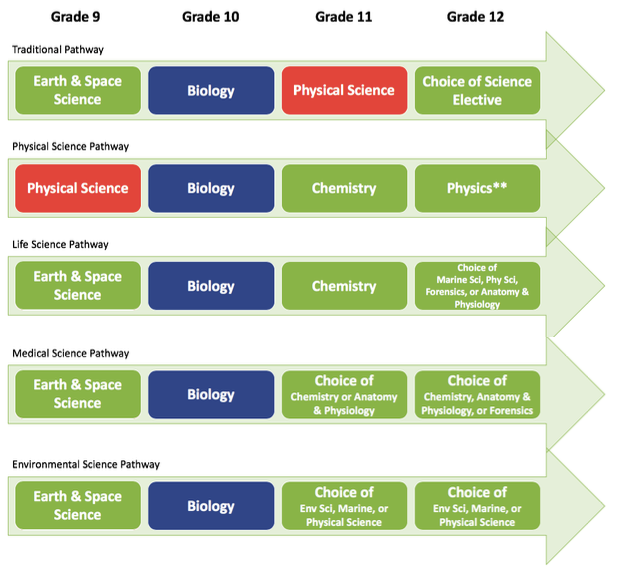Environmental Science (#2001340)
This course is an equally rigorous science course with a lab component that satisfies part of the science graduation requirement (see below)
3 Credits Science • One of which must be Biology 1, two of which must be equally rigorous science courses • Two of the three required course credits must have a laboratory component • Industry Certifications that lead to college credit may substitute for up to one science credit (except for Biology 1) • An identified computer science** course may substitute for up to one science credit (except for Biology 1)
End of Year District Final - Counts for 10% of Final Course Grade
Students expressing a desire to follow an environmental or life sciences pathway and have completed Biology.
Biology 1
Any Equally Rigorous Science Course (See Pathways Below)
Academic Pathways for Science
Traditional Science Electives:
Anatomy & Physiology, Chemistry, Environmental Science, Forensic Science, Marine Science, Physics, Physical Science
Access the Instructional Materials page to see approved instructional resources for this course.
Study of the dynamic interactions of Matter and Energy on the planet Earth. Environmental Science students will make scientifically sound decision s about local, national, and global issues. These decisions will be based on the scientific process: observe; interpret; identify and control variables; gather; examine, and use evidence to support claims; recognize bias; consider tradeoffs; propose alternative explanations.
Laboratory investigations that include the use of scientific inquiry, research, measurement, problem solving, laboratory apparatus and technologies, experimental procedures, and safety procedures are an integral part of this course. The National Science Teachers Association (NSTA) recommends that at the high school level, all students should be in the science lab or field, collecting data every week. School laboratory investigations (labs) are defined by the National Research Council (NRC) as an experience in the laboratory, classroom, or the field that provides students with opportunities to interact directly with natural phenomena or with data collected by others using tools, materials, data collection techniques, and models (NRC, 2006, p. 3). Laboratory investigations in the high school classroom should help all students develop a growing understanding of the complexity and ambiguity of empirical work, as well as the skills to calibrate and troubleshoot equipment used to make observations. Learners should understand measurement error; and have the skills to aggregate, interpret, and present the resulting data (National Research Council, 2006, p.77; NSTA, 2007).




